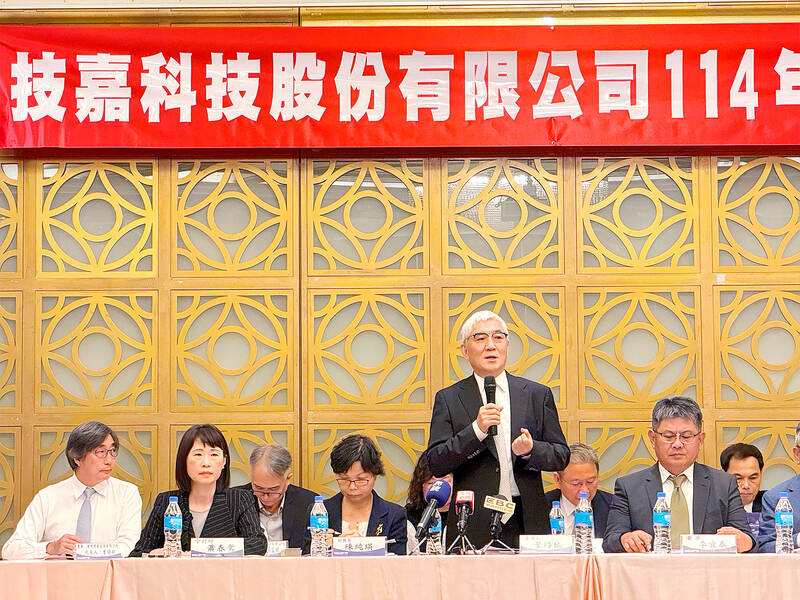Motherboard and graphics card maker Gigabyte Technology Co (技嘉) yesterday said that it plans to launch an artificial intelligence (AI) server assembly line in the US in the second half of this year.
The company’s core motherboard and graphics card businesses in the US remain stable, but sales of its higher-priced AI servers still hinge on the development of tariff policies, Gigabyte chairman Dandy Yeh (葉培城) told reporters following the company’s annual shareholders’ meeting in Taipei.
Yeh was referring to the “reciprocal” tariffs announced by US President Donald Trump on April 2, which were later postponed for 90 days.

Photo: Fang Wei-Chieh, Taipei Times
While Gigabyte is optimistic about market demand this year on the back of AI development and the rollout of new PC processors, uncertainties remain, Yeh said, citing the impact of potential tariff shifts and recent fluctuations in the New Taiwan dollar’s exchange rate against the US dollar.
The sharp appreciation of the NT dollar has inevitably placed pressure on the company’s operations, weighing on gross and operating margins, he said.
“Final calculations have yet to be completed, but there will definitely be foreign exchange losses,” Yeh said. “We hope the impact will be limited, and I still believe second-quarter revenue will remain strong.”
Thanks to strong AI demand and front-loading shipments ahead of potential tariff changes, Gigabyte’s revenue last month surged 55.2 percent month-on-month, and 107.9 percent year-on-year to a record-high NT$46.73 billion (US$1.56 billion).
The company, which also supplies gaming PCs, communication products and other computer components, saw cumulative revenue in the first five months of this year rise 34.3 percent year-on-year to NT$142.57 billion, also a record for the period, it said.
Asked whether the effect of front-loading would fade in the coming months and affect Gigabyte’s revenue momentum in the second half of the year, Yeh said the company would strive to manage the situation.
“The impact [of front-loading] would be limited to the US market alone and would not affect other markets, so we remain optimistic about the second half,” he said.
Gigabyte has partnered with semiconductor distributor Weikeng Industrial Co (威健實業) to expand motherboard sales in China, Yeh said, adding that the companies aim to boost retail sales by bundling Gigabyte motherboards with processors from Advanced Micro Devices Inc, with a focus on the Chinese retail market.
Gigabyte began shipments of its AORUS gaming PCs in March and has continued to develop the segment despite Nvidia Corp’s transition from H200 chips to B200 chips during the first half of this year, he said.

Taiwan Semiconductor Manufacturing Co (TSMC, 台積電) secured a record 70.2 percent share of the global foundry business in the second quarter, up from 67.6 percent the previous quarter, and continued widening its lead over second-placed Samsung Electronics Co, TrendForce Corp (集邦科技) said on Monday. TSMC posted US$30.24 billion in sales in the April-to-June period, up 18.5 percent from the previous quarter, driven by major smartphone customers entering their ramp-up cycle and robust demand for artificial intelligence chips, laptops and PCs, which boosted wafer shipments and average selling prices, TrendForce said in a report. Samsung’s sales also grew in the second quarter, up

LIMITED IMPACT: Investor confidence was likely sustained by its relatively small exposure to the Chinese market, as only less advanced chips are made in Nanjing Taiwan Semiconductor Manufacturing Co (TSMC, 台積電) saw its stock price close steady yesterday in a sign that the loss of the validated end user (VEU) status for its Nanjing, China, fab should have a mild impact on the world’s biggest contract chipmaker financially and technologically. Media reports about the waiver loss sent TSMC down 1.29 percent during the early trading session yesterday, but the stock soon regained strength and ended at NT$1,160, unchanged from Tuesday. Investors’ confidence in TSMC was likely built on its relatively small exposure to the Chinese market, as Chinese customers contributed about 9 percent to TSMC’s revenue last

LOOPHOLES: The move is to end a break that was aiding foreign producers without any similar benefit for US manufacturers, the US Department of Commerce said US President Donald Trump’s administration would make it harder for Samsung Electronics Co and SK Hynix Inc to ship critical equipment to their chipmaking operations in China, dealing a potential blow to the companies’ production in the world’s largest semiconductor market. The US Department of Commerce in a notice published on Friday said that it was revoking waivers for Samsung and SK Hynix to use US technologies in their Chinese operations. The companies had been operating in China under regulations that allow them to import chipmaking equipment without applying for a new license each time. The move would revise what is known

UNCERTAINTY: A final ruling against the president’s tariffs would upend his trade deals and force the government to content with billions of dollars in refunds The legal fight over US President Donald Trump’s global tariffs is deepening after a federal appeals court ruled the levies were issued illegally under an emergency law, extending the chaos in global trade. A 7-4 decision by a panel of judges on Friday was a major setback for Trump, even as it gives both sides something to boast about. The majority upheld a May ruling by the Court of International Trade that the tariffs were illegal. However, the judges left the levies intact while the case proceeds, as Trump had requested, and suggested that any injunction could potentially be narrowed to apply